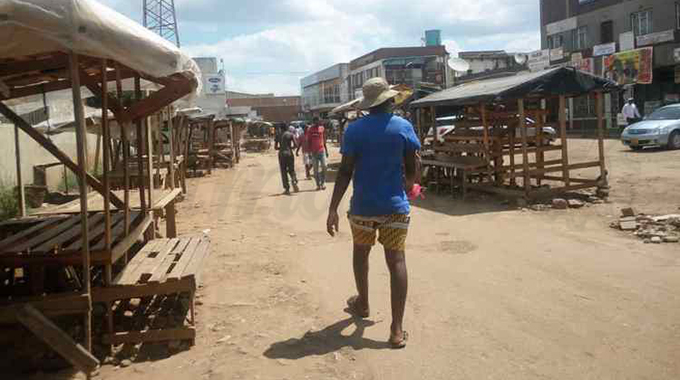Enterprise in time of disaster

Roselyne Sachiti and Tanaka Mahanya Features Writers
The bicycles are heavily loaded and rickety as they snake their way down a dust road in Norton’s Knowe low-density suburb.
It is April 1, the second morning of the 21-day complete lockdown and three men, probably in their thirties, pedal modified bicycles laden with firewood.
It is hard to cycle straight as the bicycles have to endure both human and firewood weight.
To the men, it is business as usual and they will each make one other trip, to a mountain range which cushions Lake Chivero.
Here, the trio and many others illegally cut firewood which they sell to residents of Katanga, Maridale, Govans, Knowe and Nharira just to name a few. They reserve some for personal use.
“We are aware of the complete lockdown but have to survive. This is how I survive and had not saved enough money to buy food for the lockdown,” says one of the men who only identifies himself as Baba Sam.
He says he is a father of two and makes between US$4 and US$5 per firewood load. In a day, he makes two trips bringing his earnings to US$10.
“We are afraid of being caught breaching the lockdown restrictions. We are being careful and keeping our distance. We also evade police and parks rangers. When we see them we just leave the bicycles and run,” he says.
His friend Caleb interjects.
He is afraid of Covid-19, does not know much about it and does not think it will get to them. What he knows is what he heard from other firewood poachers. Sadly, he takes the information as fact.
“Sister, my office is a forest. Does Corona stick to trees too, maya (no) I don’t think so. That is why I come every day to fetch firewood, I think I am safe,” he says.
He struggles to balance his overloaded bicycle and pedals off.
A male vendor who identifies himself only as Tawanda also on a bicycle slows down as he nears us. He is advertising his merchandise, homemade floor polish, brooms, plastic garden rakes, mops among others.
“Mitsvairo yauya, (brooms), cobra, mops to mop up Corona and everything to keep your house clean during the lockdown is here,” his sharp ear piercing voice shouts.
He is a father of two and makes brooms, mops and homemade floor polish which he usually sells from an area known as pa Speed at Katanga.
In normal times, paSpeed, a roadside open space at Katanga Shops is where vendors selling fresh and dried fish, all sorts of vegetables, floor polish, brooms, emergency re-packaged cooking oil, rice and maize-meal known as tsaona.
The vendors are separated by a tarred road as they line up along paSpeed. Here, their wares sell fast, all for cash and most vendors go there, daily.
But because of Covid-19 the area is a shadow of its former self, deserted and vendors like Tawanda are using other means like door to door marketing just to get customers.
Failing to make a sale, Tawanda cycles down the street still advertising his wares, door to door and knocking on gates.
“I will go home when I have sold a bit. If I do not do this my family will not have sufficient food during the lock-down,” he adds.
Tawanda is aware of the dangers of COVID-19 but says he has no option as he to eke a living.
He adds that when he gets home, he will wash up before doing anything or being in contact with his family.
“I bought Dettol soap sister, lots of it. I will wash when I get home,” he reveals.
After several hours, two teenage girls, Veronica and her sister Loveness walk down the road advertising fish they are selling. In two small containers, the fish, breams in particular, are their father’s catch of March 31.
Despite the 21-day lock-down, their father Peter Mukoma still travels quite a distance to Darwendale Dam where he uses nets to catch fish. Today, he is going to Darwendale and walking with the two girls who he will part ways with soon.
“The fish are priced differently. Some are for $1 for two fish, others $1 each,” the two girls reveal.
Before the complete lock-down, their father also sold his catch at paSpeed. But now, all he does is go to Darwendale, and sell his catch of the day to neighbours, some who would have placed orders.
Mukoma says a cure for COVID-19 should be found quickly as it is affecting their livelihoods.
Even if he is not playing his part of staying at home, he also prays the disease goes soon.
“When I first heard of it, I thought it was a disease for the rich who are always on planes travelling to other countries. Some of us spend the day in water fishing. Can Corona be found in water?” Makoma genuinely asks.
Before COVID-19 lock-down measures were effected, he would make up to $25 per full 20 litre bucket which they split with two other fishermen.
He says in the past week, their catch has declined.
“It’s like the fish are also afraid of Corona and are not moving as they used to. The catch has been bad over the past week,” he jokes.
Now, he brings his small share of fish home which his daughters move around selling to neighbouring households, putting them at risk of getting COVID-19 should they come into contact with an infected person.
Vimbai Muhoro (67), a vendor who usually operates in Harare’s Central Business District (CBD) has been selling fruits and vegetables at give-away prices from her Epworth home since Monday when the complete lock-down began.
She believes the month of April will be one of the toughest in her lifetime.
She rents a one roomed house in Epworth, which she shares with her two granddaughters.
“In previous months, I paid my rentals without difficulty, but right now I have many loads to carry”, she explains.
If she works every day, she makes enough money from her regular customers who sometimes tip her generously.
But the lock-down has brought all that to a standstill.
Business is not like any other day and customers coming to her home are few. Sometimes no one comes and the old woman waits patiently.
“I cannot survive with this little money I get when I sell my produce. Many people do not know of my business here. I will also find other means of survival until when all this is over.”
Fruits and vegetables which she buys in Mbare start rotting on the third day, resulting in great losses to her small business.
“I have to cut prices in half so that people buy. If I do not do that I would have lost all that I stocked from Mbare Musika last week,” she said.
Her granddaughters need groceries which she believes she will not afford to buy in the coming days. Retailers recently hiked prices of basic commodities as they believed that the lock-down period would bring business to a standstill.
Those who had stocked merchandise capitalised as they took advantage of the situation.
Had she predicted that there would be a lock-down, she would have saved enough money to stock groceries enough for the 21days.
But right now, she will have to consume the few groceries wisely until when the situation stabilises.
“My sons are struggling to earn a decent living, so I will just be adding to their problems if I ask for money,” she adds.
Mbuya Muhoro believes if the shut-down is worth saving a lot of lives, then it is a struggle she will gladly take.
“No amount of suffering can overpower death, once you lose a loved one, they will not return again.”
And as she has heard on her radio that the virus spreads rapidly, she is not willing to take the risk.
Mbuya Muhoro believes if the country stays cautious and observes the lock-down, by the end of 21 days, the disease would have disappeared.
“It is my responsibility as a Zimbabwean to make sure I abide by the rules and promote the well-being of other citizens.”
In Guruve, Zimbabwe’s Mashonaland Central Province, some farmers are also doing door to door sales. Here, the farmers are using trucks to carry their produce when they have harvested a lot from their farms.
Small scale farmers put their merchandise in buckets and baskets and move door to door looking for regular customers.
“We believe the virus will not affect us in the rural areas because our houses are haphazardly spaced and we are maintaining distance when talking,” said Chamunorwa Mugwisi, a vendor.
Some of the goods sold include fruits, an assortment of vegetables and fresh mealies.
To ensure vulnerable people like Mbuya Muhoro are cushioned, Government set in motion a number of interventions and measures to assist people through the difficult but very necessary three-week lock-down period.
Sitting on top of the list of these measures is the ZW$600 million which Government has set aside to cover one million vulnerable households in cash pay outs. The households will be identified by the Department of Social Welfare.
As the world struggles to find a cure for COVID-19, social distancing, washing hands with soap under running water, and staying at home among others have proven to be effective in limiting the rate of transmission.
As much as people want to earn a living making money in times of disaster, we cannot mask the reality by pretending it is business as usual.
COVID-19 has been killing people indiscriminately and as Zimbabweans we have to stay safe.
Feedback
[email protected] <mailto:[email protected] <mailto:[email protected]>
Twitter@RoselyneSachiti








Comments